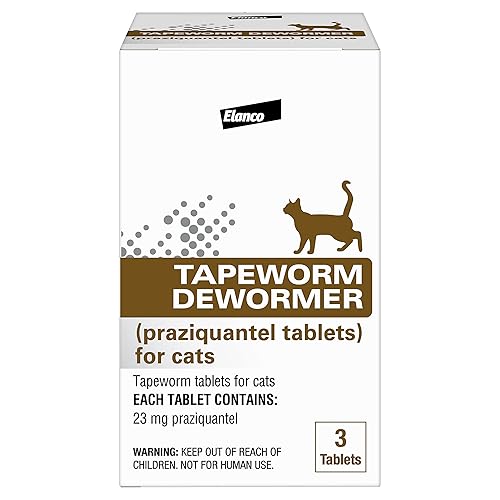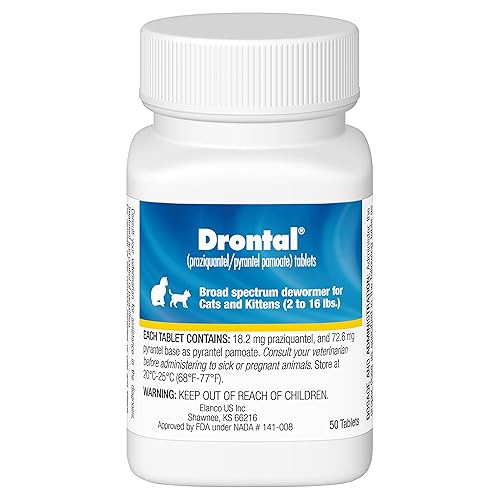Reasons why cats refuse to eat tapeworm medicine
As a cat lover, you may have encountered the challenging task of getting your feline friend to take their tapeworm medicine. It can be frustrating when your furry companion turns up their nose or does everything they can to avoid it. But why do cats refuse to eat tapeworm medicine? Let’s explore a few possible reasons:
1. Taste and Smell
Cats have a highly developed sense of taste and smell, which means they may be put off by the strong odor or bitter taste of the tapeworm medicine. Just like humans, cats have preferences, and if something doesn’t appeal to their senses, they’re more likely to refuse it.
2. Negative Association
Cats are creatures of habit and can associate unpleasant experiences with certain things, including medication. If your cat has had a negative encounter in the past while taking medicine, such as feeling nauseous or experiencing side effects, they may become wary or even fearful of taking anything new.
3. Stress or Anxiety
Cats are sensitive beings, and stress or anxiety can affect their appetite. If your cat is anxious or stressed, they may lose interest in food altogether, including the tapeworm medicine. Environmental changes, new additions to the family, or even a visit to the vet can trigger stress in cats.
4. Texture or Form
Sometimes, it’s not just the taste or smell that’s the issue. Some cats are particular about the texture or form of their food or medication. If the tapeworm medicine is in a form or consistency that your cat finds unappealing, they may refuse to eat it.
5. Underlying Health Issues
Lastly, it’s important to consider that there may be underlying health issues causing your cat to refuse the tapeworm medicine. Cats are good at hiding their ailments, so if your cat consistently refuses medication, it’s a good idea to consult with your veterinarian to rule out any potential health concerns.
The role of taste and smell in a cat’s reluctance to take medication
For cat lovers like yourself, it can be frustrating when your fur baby refuses to take their tapeworm medicine. But have you ever wondered why your feline friend turns up their little nose at the sight of it? One possible reason is the taste and smell of the medication.
Just like us humans, cats have taste buds that help them distinguish between different flavors. But here’s the catch: cats have more sensitive taste buds than we do. What may taste acceptable to you might be overpowering for your kitty. So, when it comes to tapeworm medicine, the taste can be a real deal-breaker for your feline companion.
But taste is not the only factor at play here. Cats also have an incredibly keen sense of smell. Their olfactory receptors are much more advanced than ours, enabling them to detect even the faintest of scents. And let’s face it – tapeworm medicine doesn’t exactly smell like a bowl of fresh tuna!
Moreover, cats are known for their strong aversion to bitter flavors. Bitter tastes in nature often indicate the presence of toxins, which is why cats have evolved to avoid them. Many tapeworm medications have a bitter aftertaste, which can make your cat refuse to take it.
It’s important to remember that your furry friend’s reluctance to take medication is not a personal attack on you. It’s just their natural instinct to avoid anything that tastes or smells unpleasant to them. Understanding this can help you approach the situation with empathy and come up with strategies to help your cat take their tapeworm medicine more easily.
- Cats have more sensitive taste buds than humans.
- The taste of tapeworm medicine can be overwhelming for cats.
- Cats have a strong sense of smell, and tapeworm medicines often have an unpleasant odor.
- Cats have a natural aversion to bitter flavors, which some tapeworm medications may have.
Negative experiences and their impact on a cat’s willingness to take medicine
When it comes to giving your furry friend tapeworm medicine, negative experiences can play a big role in their willingness to cooperate. Just like humans, cats can remember and associate certain things with unpleasant memories. This can include previous experiences with medicine that they didn’t enjoy.
When your cat had a bad experience with medicine in the past, such as vomiting or feeling sick, they may develop a reluctance to take medicine in the future. This can create a challenge when it comes to treating them for tapeworms. If your cat associates the taste or smell of the medicine with an unpleasant experience, they may refuse to eat it.
Additionally, if you had to forcibly administer medicine to your cat in the past, they might now associate the act of taking medication with stress or fear. This can make them wary and resistant when it comes to future dosages.
Cats are sensitive creatures with their own preferences and emotions. They can develop anxiety and stress from negative experiences, just like humans do. It’s important to understand and acknowledge their feelings when it comes to medication.
By recognizing and addressing these negative experiences, you can help your cat feel more comfortable and willing to take their tapeworm medicine. Building positive associations with medication, such as offering treats before and after giving the medicine, can help create a more pleasant experience for your feline friend.
Remember, patience and understanding are key. With a little extra effort and love, you can help your cat overcome their negative associations and ensure they receive the necessary treatment for their health.
Strategies to make the medicine-taking process easier for cats
As a cat lover, you know how challenging it can be to get your feline friend to take their tapeworm medicine. But don’t worry, there are some strategies you can try to make the process easier for both of you.
Create a Relaxing Environment
Your cat may be more willing to take their medicine in a calm and quiet environment. Make sure you choose a quiet room where your cat feels comfortable. Turn off any loud noises or distractions like the TV or radio. Creating a relaxing atmosphere will help reduce their stress and make them more receptive to taking their medicine.
Tempt Them with Tasty Treats
Using treats can be an effective way to encourage your cat to take their medicine. Before giving them the medicine, offer them a tasty treat that they really enjoy. This will help create a positive association with the medicine-taking experience. After they have finished taking their medicine, reward them with another treat. They will start to see it as a rewarding activity and may be more willing to cooperate in the future.
Choose the Right Form of Medicine
Some cats may have a preference for the form of medicine they take. If your cat refuses to take the medicine in its current form, try different options. For example, if they don’t like tablets, ask your veterinarian if a liquid or powder form is available. You can also ask for flavored medicine or see if it can be mixed with their food. Finding the right form that your cat finds more palatable will make the process much easier.
Seek Professional Guidance
Don’t hesitate to reach out to your veterinarian for advice and guidance. They have experience dealing with cats and may have additional strategies or alternative medicines that could work better for your furry friend. They can also provide helpful tips on how to administer the medicine effectively and safely.
Tips to overcome your cat’s resistance to tapeworm medicine
Is your cat being stubborn and refusing to take their tapeworm medicine? Don’t worry, you’re not alone! Many cat owners face this challenge, but there are some simple tips that can help you overcome your cat’s resistance and ensure they get the treatment they need.
- Create a Calm and Comfortable Environment: Cats are more likely to cooperate when they feel safe and relaxed. Choose a quiet room free from distractions where you can administer the medicine. Make sure the temperature is comfortable and provide soft bedding for your cat to lie on.
- Offer Tasty Treats: Before giving your cat the medicine, entice them with their favorite treats. This can help create a positive association with the medicine and make it more appealing. Afterward, give them another treat as a reward for their cooperation.
- Different Forms of Medicine: If your cat refuses to take the medicine in its current form, consider trying different options. Tapeworm medicine is available in various forms such as pills, pastes, and liquids. Consult with your veterinarian to determine which form may be more palatable to your cat.
- Hide the Medicine: Some cats are experts at detecting medicine and will refuse to eat anything containing it. In such cases, you can try hiding the medicine in a small treat or wrapping it in a soft piece of meat or cheese. Just make sure your cat consumes the entire treat to ensure they get the full dose.
Remember, it’s important to consult with your veterinarian to discuss your cat’s resistance to tapeworm medicine. They can provide additional strategies or recommend alternative medicines if needed. With a little patience and creativity, you can successfully overcome your cat’s resistance and ensure they stay healthy and worm-free.
So, don’t stress out if your cat refuses their tapeworm medicine. By following these tips, you’ll be well on your way to resolving the issue and keeping your furry friend in good health.
Conclusion
By implementing the tips mentioned in this article, you can increase the chances of successfully administering tapeworm medicine to your cat. Remember to create a calm and comfortable environment, offer tasty treats before and after giving the medicine, and try different forms of medicine if needed. Additionally, hiding the medicine in treats or food can make the process easier for both you and your cat.
It’s important to note that if your cat continues to resist taking the tapeworm medicine, it’s always best to consult with a veterinarian. They can provide you with additional strategies or alternative medicines that may be more effective for your cat’s specific needs.
With a little patience and some trial and error, you’ll be able to find a method that works for your feline friend. Don’t get discouraged if it takes a few tries – just keep experimenting until you find what works best. Your cat’s health and well-being are worth the effort.
How can I overcome my cat’s resistance to tapeworm medicine?
Creating a calm and comfortable environment can help. Offer tasty treats before and after giving the medicine. Try different forms of medicine or hide it in treats or food. Consult with a veterinarian for additional strategies or alternative medicines.
What are some tips for giving tapeworm medicine to a resistant cat?
Some tips include creating a calm environment, offering tasty treats before and after giving the medicine, trying different forms of medicine, and hiding the medicine in treats or food. Consulting with a veterinarian for additional strategies or alternative medicines is also advised.
Why is it important to consult with a veterinarian regarding tapeworm medicine?
Consulting with a veterinarian is crucial because they can provide additional strategies or alternative medicines to help overcome your cat’s resistance. They have the expertise to prescribe the most suitable medicine and guide you on the proper administration.

















